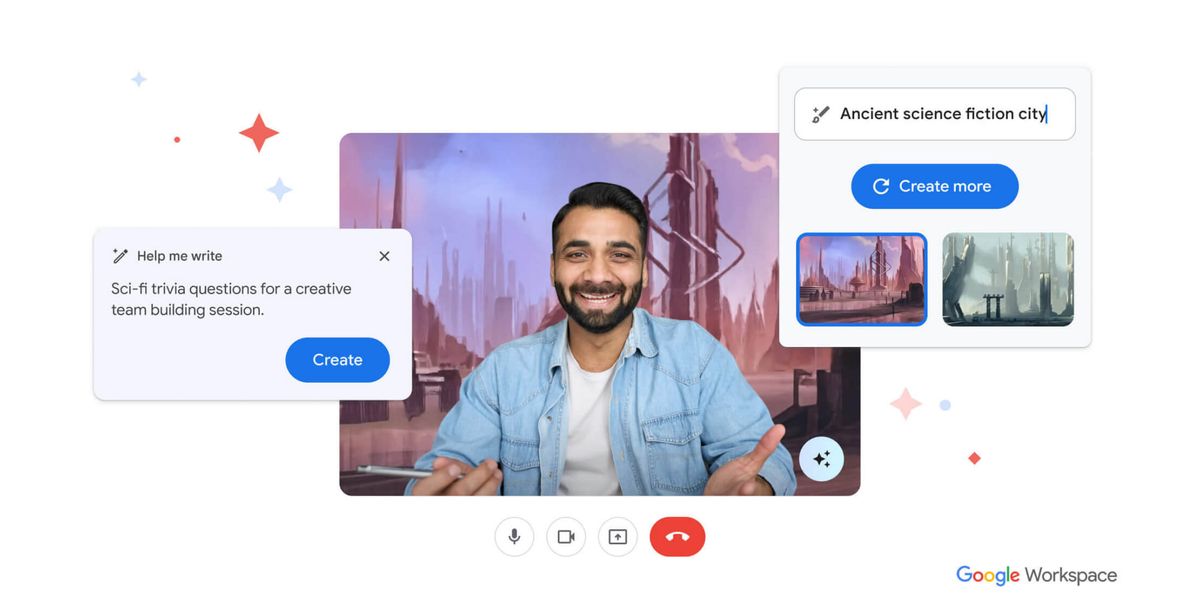
Today, Google announced Duet AI for Google Workspace, its suite of productivity tools used by over 2 billion users. Across Gmail, Docs, Slides, Sheets, and Meet, Duet AI provides users with AI-powered compose suggestions, data organization tools, and custom graphics options. This represents Google's shift towards an AI-first approach, where machine learning aids in streamlining workflows, spurring creativity, and automating routine tasks. However, with this great promise of AI's potential, there also comes inherent risks and challenges that must be acknowledged.
The on-stage demos and early previews of Duet AI are impressive. Duet AI is deeply integrated into Gmail and Docs, going beyond mere grammar and spelling corrections to provide contextual assistance and enhance writing tasks. In Google Slides, Duet AI will offer text-to-image generation capabilities. Google Sheets will benefit from automated data classification and planning features. Google Meet users can look forward to generating personalized video call backgrounds. Furthermore, the "smart canvas" in Docs will use Duet AI to dynamically add relevant updates to documents, streamlining teamwork.
AI will undoubtedly transform how we work together. Duet AI showcases Google's vision for AI that completes complex work and fuels human creativity by automating mundane tasks across their productivity tools. Experts will now have more time to focus on complex problem-solving, critical thinking, and building connections with colleagues.
However, deploying AI at such a massive scale requires thoughtful consideration of the associated risks. Any large system presents vulnerabilities that could be exploited if not properly addressed. Users need transparency and straightforward controls to determine the extent of Duet AI's involvement in their work. While AI excels at routine functions, it still struggles with nuanced, empathetic reasoning that is inherently human.
Whether Duet AI significantly improves productivity depends largely on how Google chooses to develop and apply it. If integrated responsibly - with close consideration of AI's limitations, potential overreach, and opportunities for human partnership - Duet AI could make complex work simpler while enhancing creativity. If implemented irresponsibly, it may undermine privacy, security and workforce stability.
The future of work exists at the intersection of human effort, skills and technological innovation. While AI will radically change how businesses operate, human judgment, collaboration and oversight remain essential to progress. Duet AI illustrates both the exciting possibilities of AI as well as the diligent governance required to ensure its safe, fair and beneficial development.
With prudent management and a focus on human-AI symbiosis over pure automation, Google's push into an AI-powered future of work could unlock new realms of productivity and creativity. But we must be vigilant, vocal and willing to guide these systems to align with human priorities and values. AI may transform our work software, but humans are still very much needed to shape how that transformation unfolds.
Google has assured users that it adheres to its AI principles, emphasizing user control and privacy, but only time will tell how these policies play out in practice. Duet AI promises to be more than just an assistant; it aspires to be a collaborator, a tool that empowers users to work more efficiently and creatively. As we continue to monitor its development and uptake, one thing is clear - the future of work is being redefined, and our choices around AI will determine if it leads to opportunity or peril.

